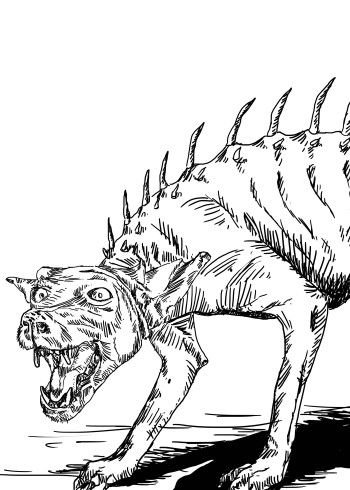Mexico Unexplained: The Chupacabra
The word Chupacabra comes from two Spanish words, chupa “suck” and cabra “goat.” Sometimes the pluralized form is used: Chupacabras. Unlike many myths and legends that stretch back to times before people can recall dates, investigators know when the Chupacabra first appeared: March of 1995. Yes, that means it is a newly hatched cryptid, the new kid on the block of demons and monsters. Where did it come from? What does it look like?
There are two types of creatures that have been sighted by people that have been classified as a Chupacabra. The first is one that looks like a reptile with spikes on its back, standing about 4 feet tall, often times with red eyes and wings like a flying squirrel. Creatures in the second group look like a skinny, larger, hunched over dog with patchy fur or no fur.
As previously mentioned, the Chupacabra first appeared in March of 1995 which makes him a relatively new monster. It first appeared not in Mexico but in Puerto Rico. In the spring of 1995 the residents of 2 small Puerto Rican towns had discovered dead farm animals on their properties, and the animals had two incisions on their necks, and reportedly, all the blood drained from them. The creature was not actually spotted until 5 months later and its description was very vivid: It was almost reptilian, with bat-like wings, claws and spikes on its back. This first Chupacabra encounter was described in great detail at the time by the Puerto Rican tabloids and later in a book published in 1997 by Scott Corrales called Chupacabras and Other Mysteries which received attention from the curious outside of Puerto Rico. A flurry of sightings happened right after the creature was talked about on the pan-Latin American talk show hosted by the bleached blonde, Cuban-born Cristina Saralegui called “Cristina”. The first sighting in Mexico happened right after that broadcast. This made people wonder, did the show give people permission to talk about this phenomenon or were people just hallucinating because of ideas put in their heads by this television program?

One well-publicized story of a sighting of this creature involved an older lady who woke up to find a chupacabra in her house. According to the reports based on interviews with the woman, the creature understands Spanish. She yelled at the chupacabra and called it a pendejo, and almost in a reaction of shame, the creature covered its face with a wing, shivered a bit and then disappeared behind her washing machine. Perhaps what happened speaks less about the chupacabra’s ability to understand human language and more about the powers of intimidation of the Mexican nana.
A wave of reports occurred in the late 1990s across northern Mexico and the state of Jalisco in central/western Mexico. Many of these sightings were of the wingless, hairless doglike creature. In May of 1996 there was a rash of sightings in the rural parts of the state and many dead animals with the characteristic bite marks on the necks, especially in goats and sheep. The director of the Guadalajara Zoo went out to some of the ranches and took plaster casts of footprints and said that the creature was probably a large dog. Two investigators from Mexico City, Patricia and Mario Mendez Acosta also traveled out to rural Jalisco to look into the phenomenon. They even set up traps to catch the chupacabra and each time caught wild dogs. A local police official made a comment at the time saying that locally the chupacabra phenomenon could be explained away by wild dogs and that the wave of sightings was part of “una gran psicosis,” a great psychosis. Many Mexicans believe that the whole thing is a joke and that only the gringos would take the story seriously enough to investigate such nonsense. Ironically, throughout Mexico, sightings of the chupacabra have been decreasing with time. Sightings are now few and far between.
The early sightings in Puerto Rico, of the slightly winged reptile kind were blamed on UFOs and even the U.S. military. America has long used Puerto Rico as kind of a dumping ground, according to locals, and some people suspected that the chupacabra was some sort of chimera, or blend of two or more animals, and the product of a biological experiment gone wrong. One Puerto Rican tabloid even alleged that eyewitnesses saw the creature being transferred by the US military from a crashed saucer site. Somewhere along the way the Chupacabra got loose after a wreck on a back road. No other news outlets could confirm this story.
Some Mexican and Texan chupacabras have actually been tested and examined. A famous photo made its rounds on the internet of a chupacabra supposedly killed in south Texas near the Mexican border. Animal experts have claimed that these are dogs, coyotes or even raccoons with types of mange or scabies, diseases that stress the animals and cause their hair to fall out, make them look disheveled and give them a foul odor. The diseases may also weaken the animals to such an extent so as to cause them to go after domestic livestock instead of hunting or foraging normally. There have been formal DNA tests on some of these animals to determine that they are indeed dogs or other known animals.
But what would explain those other sightings? The ones where the creature is standing upright or that it has spikes on its back or even wings? Is it part of a “Gran Psicosis” or an entirely new creature either recently discovered, manufactured in a lab or imported from another world? As with so many other legendary creatures, a body to examine would really help investigators, but until the time that one of these animals can be trapped or killed, the chupacabra will remain a mystery.